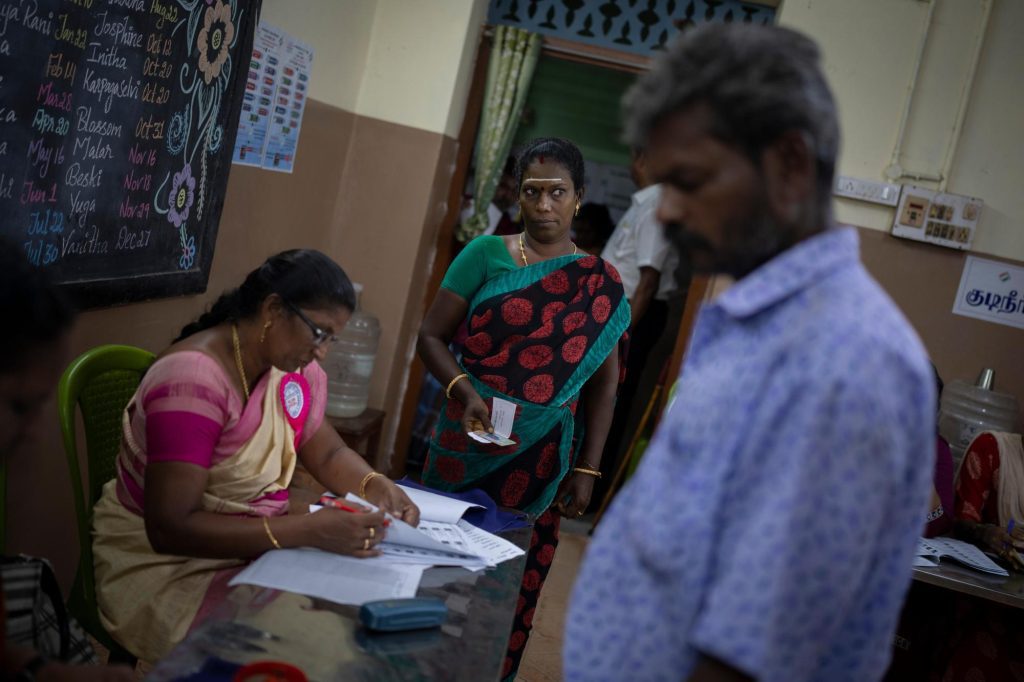By ASHOK SHARMA and KRUTIKA PATHI (Associated Press)
NEW DELHI (AP) — Many Indians began voting on Friday in a six-week election that will decide the fate of Narendra Modi, the popular prime minister who has supported a strong form of Hindu nationalist politics and is seeking a rare third term as the country’s leader.
People started lining up at polling stations hours before they were allowed in at 7 a.m. in the first 21 states to hold votes, from the Himalayan mountains to the tropical Andaman Islands. Nearly 970 million voters — more than 10% of the world’s population — will elect 543 members to the lower house of Parliament for five years during the staggered elections that run until June 1. The votes will be counted on June 4.
This election is considered one of the most significant in India’s history and will challenge the extent of Modi’s political power.
If Modi wins, he’ll be only the second Indian leader to keep power for a third term, after Jawaharlal Nehru, the country’s first prime minister.
Most polls predict a win for Modi and his Hindu nationalist Bharatiya Janata Party, who are up against a broad opposition alliance led by the Indian National Congress and influential regional parties.
It’s uncertain who will lead India if the opposition alliance, called INDIA, wins the election. Its more than 20 parties have not put forward a candidate yet.
The BJP controls much of India’s Hindi-speaking northern and central parts, but is now trying to gain a foothold in the east and south. Their toughest challenge is in the southern Tamil Nadu state, with 39 seats, where voting is being held Friday.
Voters in hot and humid Chennai, the state’s capital, began briskly filling the city’s nearly 4,000 polling booths. A number of them said they were voting for a change in federal government given increasing prices, unemployment and religious division fueled by the BJP.
“First thing I came to vote for is to have a country without any religious disharmony. In Tamil Nadu — Hindus, Muslims, Christians, we’re all together. And this unity should grow,” said 65-year-old Mary Das, who was waiting to vote.
P. Chidambaram, an opposition Congress party leader and the country’s former finance minister, said that the people of Tamil Nadu would not vote for the BJP as “it is imposing one language, one culture, one system and one kind of food.”
The BJP has long struggled to capture votes in the state, where two powerful regional parties — the Dravida Munnetra Kazhagam and All India Anna Dravida Munnetra Kazhagam — dominate. The BJP drew a blank in 2019, and won one seat in 2014.
In Rajasthan, people returning from polling stations covered their heads against dusty winds.
“If the new government is able to solve unemployment, then it will be good. People are migrating from this region to earn a living,” said Atinder Singh, 26.
Voting is also taking place in the northeastern state of Manipur, where a near-civil war for a year has caused ethnic violence. Mobs have rampaged through villages and torched houses, and more than 150 people have been killed.
The election follows ten years of Modi's leadership, during which the BJP has gained power by focusing on Hindu-first politics and economic growth.
Modi has increased Hindu nationalist language during the campaign, and has tried to show himself as a global leader. His ministers praise him as the leader of a surging India, while his supporters applaud his pledge to make India a developed nation by 2047, the 100th year of independence.
Despite India having one of the world's fastest-growing economies, many of its people are experiencing increasing economic hardship. The opposition alliance hopes to address this, aiming to rally voters around issues such as high unemployment, inflation, corruption, and low agricultural prices that have led to two years of farmers' protests.
Opponents — and critics — also claim that Modi has become more authoritarian. They accuse Modi of using tax authorities and the police to intimidate the opposition, and they worry that a third term could weaken India's democracy. His Hindu nationalist politics, they argue, has created intolerance and threatens the country's secular foundations.
“Modi has a very authoritarian mindset. He doesn’t believe in democracy. He doesn’t believe in Parliamentarianism,” said Christophe Jaffrelot, a political scientist who has written about Modi and the Hindu right.
Modi maintains that India's dedication to democracy remains strong. He stated at a Summit for Democracy gathering in New Delhi in March that “India is not only fulfilling the aspirations of its 1.4 billion people, but is also providing hope to the world that democracy delivers and empowers.”
The Indian leader, who enjoys widespread popularity, is aiming for a two-thirds majority this time.
The BJP aims for a significant victory fueled by its popular welfare programs, which it claims have improved access to clean toilets, health care, and cooking gas, as well as providing free grain to the poor. Initiatives such as the construction of a controversial temple to Ram on the site of a demolished mosque, and the abolition of the disputed Muslim-majority region of Kashmir’s former autonomy, may resonate with supporters who see him as the champion of the Hindu majority.
“Any party that comes back for a third term, and with a brute majority, is a scary prospect for democracy,” said Arati Jerath, a political commentator.
Modi’s two terms have seen civil liberties in India come under attack, while implementing what critics say are discriminatory policies. Peaceful protests have been crushed with force. A once free and diverse press is threatened, violence is on the rise against the Muslim minority, and government agencies have arrested opposition politicians in alleged corruption cases.
The BJP has denied its policies are discriminatory and says its work benefits all Indians.
___
AP writer Sibi Arasu contributed reporting from Chennai, India.









